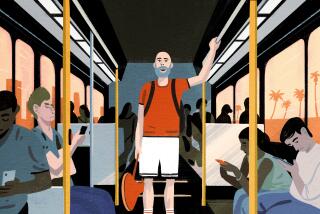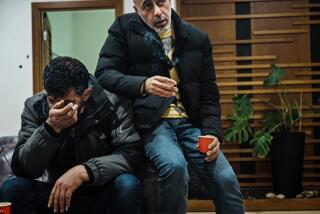On a bus but going nowhere in Cairo
- Share via
CAIRO — It wasn’t the kind of dawn a man relishes, but it came nonetheless, foggy and cold, a light wind blowing past the spoiled glamour of the Cleopatra Palace Hotel. Beneath the overpass, Mohammed Atteya, a father of two, sat in his minibus, angry about rising milk and gas prices and troubled by the way a life can turn out.
Students, laborers and a few clerks clambered aboard and paid him a fare of 1.25 pounds (23 cents) each. The door slid shut and Atteya swung left, straightened out and slipped into traffic. He is a man for hire, leasing a richer man’s bus, putting up with surly passengers, paying bribes to cops. At the end of each month he doesn’t even have enough left over to buy a rose for his wife.
“I smile because if I didn’t I’d explode,” said Atteya, 31, a slender man, his eyes squinting through the rain on the windshield. “Milk costs 4 pounds; it used to be 2. I used to fuel this bus for 25 pounds; now it costs 45 pounds. I dream of owning my own bus, but that would cost at least 150,000 pounds. That would take a miracle. It shouldn’t be like this.”
Egypt is a nation of millions of Atteyas trying to survive amid inflation, corruption, battered roads, broken buildings and a government that has yet to ease their burden. President Hosni Mubarak’s ruling National Democratic Party is considering further cuts to food and energy subsidies to ease public debt.
Salaries are stagnant; doctors, some earning as little as $45 a month, have threatened a nationwide strike; and many Egyptians walk around clenched up and angry, waiting to be provoked.
The dour spirit of the times rides in the crowded minibuses of Cairo. Chinked and rusted, windows cracked, tires bald, seats ripped, minibuses careen through alleys and zigzag over overpasses. They are held together by scavenged screws and borrowed bolts; they rattle and screech and, sometimes, shudder and die on the roadside. Passengers tumble out unexpectedly. The driver may not have a license; insurance is two guys fighting over a dent until one agrees to shell out cash on the spot.
But the minibuses are a cheap, never-ending flood -- a quasi-regulated necessity born of a Cairo whose population jumped from 6.8 million in 1996 to more than 17 million today. Their ranks began growing years ago when farmers and mill boys left the Nile Delta for the metropolis.
Routes aren’t numbered. There’s no such thing as a monthly pass. If you miss one driver, there’s another one coming, maybe not headed exactly where you want to go, but Cairo is a coil of chaos, not a city of precision.
--
Inside the buses, amid air fresheners doomed by exhaust, a nation grumbles. It might be a professor on his way to the university, a shopkeeper late for work, a veiled woman weighted by bean sacks, or a man with kids and no job who is out riding, hoping for better luck beyond the Nile.
The men behind the steering wheels know the stories. Some are whispered, some are shouted; narratives of despair compressed into the time it takes to go from one bus stop to the next. The drivers, the most notorious and cursed on the streets for their dangerous acrobatics, are hard-edged and philosophical -- a lot can trickle through the mind while sitting in traffic.
“A year ago I bought bread for 25 piasters [Egyptian cents]. Now I pay 50,” said Saad Abdel Gayed, a driver with meticulous sideburns and the hunched air of a boxer, a flyweight. “You have to blame the government. The officials have their own standard of living and they don’t care about us. We’re under pressure, but we don’t have time to speak of it because we’re struggling morning through night. I want to participate in these strikes and protests, but I just don’t have time because I have to support my family.”
That sentiment has Egyptians recalling the bread riots of 1977, when then-President Anwar Sadat’s proposal to trim food subsidies was quickly dropped after hundreds of thousands of protesters clashed with police in nationwide demonstrations. At least 70 people died.
It is uncertain whether things are headed that way now. But with labor unrest flaring across the country and a growing disillusionment with the government, some columnists are suggesting that Egyptians may be edging closer to rebellion.
Koran verses spinning from his tape deck, Gayed drove through the Nasr City neighborhood, home to Cairo’s CityStars mall. He doesn’t shop there, and most of his passengers can’t afford it either. He and his brothers run two buses, shouldering loan payments of about $550 a month. A 34-year-old father of three, Gayed dropped out of college 13 years ago and has been driving and tinkering with engines ever since. His dashboard is worn, his seat slightly tilted.
“The only price that hasn’t gone up so far is for the air you breathe,” Gayed said.
--
He shot up an overpass, hugging the inside of a long curve, slowing amid the glow of tail lights. Pollution smudged the horizon; the train station lay ragged and busy beneath him; kids sold sesame buns between cars; street sweepers whisked the curbs; and clay-colored mosques stood in the distance beyond the cemeteries in a district called the City of the Dead. Gayed braked and accelerated, darting like a water bug across five lanes, slipping into spaces opening and closing before him.
“We just need someone merciful to come to power,” he said. “But we know now there will be no regime change. We need someone to rise from the masses and take over, but I don’t like anyone I see out there.”
Atteya drives the same route as Gayed and thinks the same things. “I was 5 years old when Mubarak came to power,” he said. “We’re not really allowed to choose who rules us. Democracy is not applied in Egypt.”
Atteya’s father was a shoemaker. Atteya trained as an electrician, but didn’t like the job and started collecting tickets on a neighborhood minibus, earning about $2 a day. Today, he makes about $190 a month, not including the $40 he pays to two police officers, one at the bus station, another over the bridge. It seems to Atteya that the city is divided between two kinds of people, those lurking for bribes and those trying to figure out how not to pay them.
He likes to drive, but the road is seldom clear, except at those rare moments, especially early in the morning, when the traffic breaks and Atteya can speed with something approaching abandon. He works the day shift; his brother takes over the bus at night.
“Three or four years ago, there were only 20 buses driving my route. Now, there are 55,” he said. “Life was easier in the past. My father had his own shop. He had a good income. But he died when I was 14 and I had to support my mother and two sisters.”
He pulled into the station near the Cleopatra Palace, across from the Egyptian Museum. Drivers sipped tea in the rain, yelled at one another, waited for fares. They counted money, arranging bills in sequential order. Wads, suggesting more value than actual worth, were jammed into pockets. Cops lingered. A guy flipped his hood, men prostrated and prayed on the grass at the station’s edge. A woman hurried through a sliding door and found a seat amid steamed windows.
Atteya waited. The Nile took shape as the fog receded; the shoeshine boys looked for a dry spot beneath the overpass. The night-shift cops were heading home, talking raspy. Atteya pushed back from the steering wheel and checked the defroster. Life. You laugh and you make do; this is what his eyes said. The bus full, Atteya turned the ignition, gave it a little gas and slipped into the din.
--
Noha El-Hennawy of The Times’ Cairo Bureau contributed to this report.
More to Read
Sign up for Essential California
The most important California stories and recommendations in your inbox every morning.
You may occasionally receive promotional content from the Los Angeles Times.











